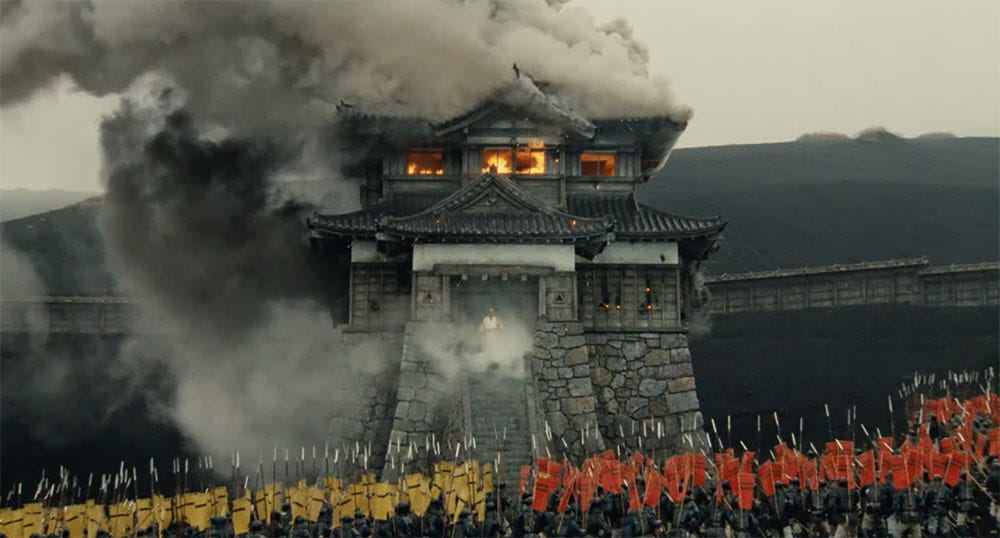Look, I love Orson Welles' Chimes at Midnight to death, but this is something else. Visually, it has to be one of the 6 or 7 most amazing movies ever made (the stylistic mix of theatrical conventions and real landscapes is astonishing), but conceptually it boggles the mind. Not content with making a Japanese epic out of Lear (arguably the hardest-to-adapt of the "top 4" Shakespeare tragedies), Akira Kurosawa chooses to bring in Macbeth. Anyone tackling those two at once and seeing if he can go beyond them should've met a colossal failure. But it’s not the case. He's introduced an element of Macbeth's Scottish savagery into Lear/Hidetora, so when the exiled Hidetora wanders into heaths and ruins he is confronting not just the elements and the meaning of what it is to be human and the fallen illusion of kingship but his own brutality--the ruins are ruins because of him. A bunch of stones and weeds are literally (not poetically) the kingdom of his own making. Far more than is apparent in the Lear play, the past wreaks havoc on all of Ran. Only in the forgetting of the past (in madness, human frailty) there is respite, as in the scene where Hidetora is seen picking flowers with a glorious dumb smile on his face.
And the present action seems inspired by Macbeth, as well. Lady Kaede has a far better reason than Lady Macbeth to curse all possible futures: revenge for her means reverting back to the past where her family was annihilated, and to that purpose the future must be damned, wiped out. Kurosawa choreographs the cavalry, banners and armies as illusions of warfare: what they stand for is irrational bloodshed, not war. None of the battles build up to anything: they begin orderly and fall into chaos. And every little change from the source material is inspired, from using the chaos of the Third Castle battle as a stand-in for the thunderstorm from Lear (containing the most amazing images of death, culminating in Hidetora's hellish-angelic descent), to the use of the blind man in the hut in place of Edgar. The effect of Lear/Macbeth having combined forces seems to concentrate all the focus on Hidetora. There's no way back or way forward, no past or future--Hidetora shut down both.
And because it's a Kurosawa movie, it has resonances that Shakespeare obviously couldn't have intended. There's Mieko Harada, the best Lady Macbeth I'll ever see, licking and practically raping Lord Jiro in a way that might make the Bard blush. The obsession with gunpowder reappears, as it had in Kagemusha, as an intrusion from unseen modernity: as an aberration. There seems to be a hell just outside the movie we're actually watching--which is in itself Hell enough, except for the shots of sky and clouds that rhythmically make its way into the movie. There's one bit when Hidetora wakes up and can see only clouds and immensity that is pure Tolstoy. And it messes with the film and enriches it, because such a Tolstoy moment shouldn't belong here, but it does. And it's impossible to take in the mad Hidetora imagery without thinking of post-war Japan and its fall into chaos from a traditional Japanese perspective. When the blind man drops the image of Buddha and stands on the cliff, totally lost, the effect is disquieting. We're used to doubt and agnosticism in movies from the West, obviously, but the effect of seeing it in a Japanese epic about the past cuts deeper. (A past, I think, Kurosawa isn't deconstructing but enriching as he sees through the cracks.) If there’s a better adaptation of Shakespeare’s work on film, I’m not aware of it.
Discussion about this post
No posts




